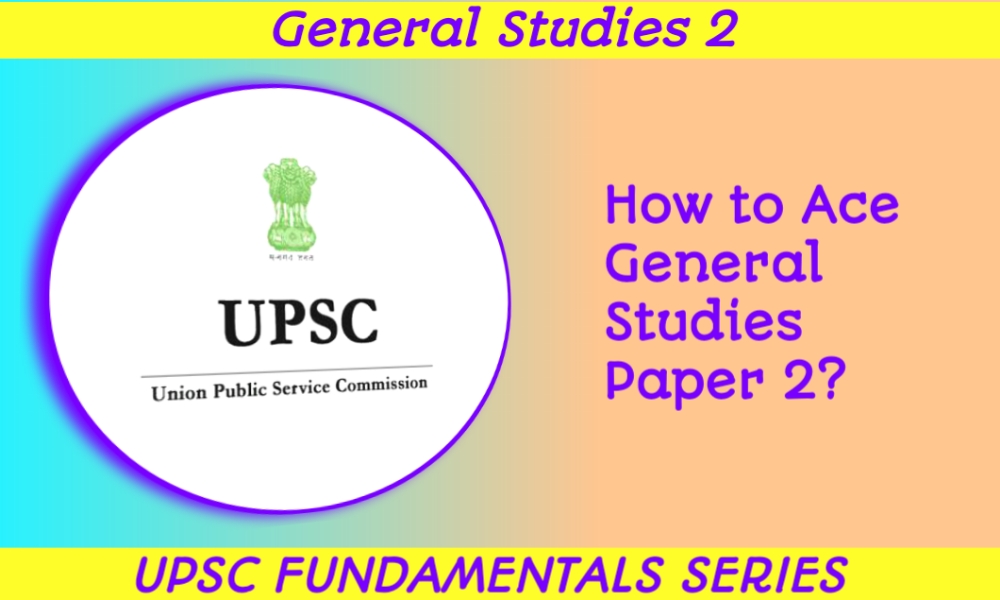How to ace General Studies Paper 2?
General Studies Paper 2 (GS 2) is a crucial component of the exam, assessing a candidate's understanding of governance, polity, social justice, and international relations. This paper demands a comprehensive grasp of current affairs intertwined with static concepts.
HOT TOPICSFUNDAMENTAL
12/29/20245 min read


How to Ace General Studies -2?
The UPSC Civil Services Examination (CSE) Mains General Studies Paper 2 (GS 2) is a crucial component of the exam, assessing a candidate's understanding of governance, polity, social justice, and international relations. This paper demands a comprehensive grasp of current affairs intertwined with static concepts. Acing GS 2 requires a strategic approach, combining thorough preparation with effective answer writing. This detailed guide elaborates on the syllabus, offering a structured plan to excel in this paper.
Understanding the Syllabus:
The GS 2 syllabus, as defined by the UPSC, encompasses the following broad areas:
Governance: This includes topics like constitutional framework, executive, legislature, judiciary, various government ministries and departments, statutory and regulatory bodies, quasi-judicial bodies, welfare schemes, mechanisms, laws, institutions, and bodies constituted for the protection and betterment of vulnerable sections.
Polity: This segment focuses on Indian Polity, covering historical underpinnings, evolution, features, amendments, significant provisions, and basic structure of the Constitution. It also includes functions and responsibilities of the Union and the States, issues and challenges pertaining to the federal structure, devolution of powers and finances up to local levels, and separation of powers between various organs.
Social Justice: This section deals with issues relating to poverty and hunger, social sector/services relating to health, education, human resources, issues relating to development and management of social sector/services, and issues relating to poverty and hunger.
International Relations: This covers India and its neighborhood- relations; bilateral, regional and global groupings and agreements involving India and/or affecting India’s interests; effect of policies and politics of developed and developing countries on India’s interests, Indian diaspora.
Structured Plan to Excel in GS 2:
Acing GS 2 necessitates a multi-pronged approach encompassing the following:
Building a Strong Foundation:
NCERTs: Start with NCERTs (Class 6-12) for Polity (especially Indian Constitution at Work, Political Theory), Sociology, and Indian History.12 These books provide a fundamental understanding of basic concepts.
Standard Books: After NCERTs, move to standard books like:
Indian Polity by M. Laxmikanth: This is the bible for Indian Polity and covers the subject comprehensively.
Introduction to the Constitution of India by D.D. Basu: Provides a detailed analysis of constitutional provisions.
Governance in India by M. Laxmikanth: Covers various aspects of governance, including institutions, policies, and challenges.
Social Problems in India by Ram Ahuja: Offers insights into various social issues prevalent in India.
Challenge and Strategy: Rethinking India's Foreign Policy by Rajiv Sikri: Provides a comprehensive overview of India's foreign policy.
Bare Act of the Constitution of India: Familiarize yourself with the original text of the Constitution.
Understanding the Interconnectedness of Topics:
GS 2 is not about studying topics in isolation. It's about understanding the interlinkages between governance, polity, social justice, and international relations. For example, a question on federalism might require you to discuss the role of the Finance Commission (Governance), the constitutional provisions related to Centre-State relations (Polity), and the impact of federalism on social welfare schemes (Social Justice). Similarly, a question on India's foreign policy could involve discussing its impact on the Indian diaspora (International Relations) and its implications for domestic policies (Governance).
Focusing on Current Affairs:
Current affairs form a significant part of GS 2. Stay updated with national and international events by regularly reading:
The Hindu/Indian Express: These newspapers provide in-depth coverage of current events and analytical articles.
Press Information Bureau (PIB): Follow PIB for official government releases and information on policies and schemes.
PRS Legislative Research (PRS): PRS provides detailed analyses of bills, acts, and parliamentary debates.
Ministry Websites: Regularly visit the websites of relevant ministries like the Ministry of External Affairs, Ministry of Social Justice and Empowerment, Ministry of Health and Family Welfare, etc.
Magazines like Yojana and Kurukshetra: These magazines offer valuable insights into social and economic issues.
Linking Current Affairs with Static Concepts:
The key to scoring well in GS 2 is to link current events with the static portions of the syllabus.21 For example, if there's a news item about a new government scheme for women's empowerment, connect it to the constitutional provisions related to gender equality, the role of various ministries and departments in implementing the scheme, and the challenges faced by women in India.
Developing Analytical Skills:
GS 2 questions are often analytical and require you to critically evaluate different perspectives. Develop your analytical skills by:
Practicing answer writing: Regularly write answers to previous years' questions and mock tests.
Reading editorials and opinion pieces: This will expose you to different viewpoints and improve your analytical thinking.
Participating in discussions and debates: This will help you articulate your thoughts and refine your arguments.
Answer Writing Strategy:
Understand the question: Carefully read the question and identify the key demands.
Structure your answer: Organize your answer into a clear introduction, body, and conclusion.
Use relevant examples and data: Support your arguments with relevant examples, data, and case studies.
Maintain a balanced perspective: Present both sides of the argument and offer a balanced conclusion.
Write concisely and clearly: Use simple language and avoid jargon.
Adhere to the word limit: Practice writing within the given word limit.
Specific Strategies for Each Sub-Topic:
Governance: Focus on understanding the functioning of various institutions, the challenges they face, and possible reforms. Pay attention to e-governance initiatives, citizen charters, and accountability mechanisms.
Polity: Have a thorough understanding of the Constitution, its amendments, and landmark judgments. Focus on issues related to federalism, separation of powers, and fundamental rights.
Social Justice: Focus on understanding the root causes of social problems and the effectiveness of various government interventions. Pay attention to issues related to poverty, hunger, education, health, and vulnerable sections of society.
International Relations: Focus on understanding India's foreign policy objectives, its relations with neighboring countries, and its role in regional and global groupings. Pay attention to current international events and their implications for India.
Revision and Mock Tests:
Regular Revision: Regularly revise the static portions of the syllabus and your current affairs notes.
Mock Tests: Take regular mock tests to assess your preparation and identify your weaknesses. Analyze your performance and work on improving your answer writing skills.
Time Management:
Effective time management is crucial for GS 2. Allocate sufficient time for each section of the syllabus and practice writing answers within the stipulated time.
Example of Linking Current Affairs with Static Concepts:
Current Affair: The government introduces a new data protection bill.
Linking with Static Concepts: This can be linked to fundamental rights (right to privacy), governance (data governance framework), and polity (parliamentary debates and legislative process). You can discuss the implications of the bill for individual rights, the role of regulatory bodies in data protection, and the challenges in balancing privacy with national security.
Sample Study Plan (Adaptable):
Phase 1 (2-3 Months): Focus on building a strong foundation with NCERTs and standard books.
Phase 2 (3-4 Months): Start focusing on current affairs and linking them with static concepts. Practice answer writing regularly.
Phase 3 (2-3 Months): Focus on revision, mock tests, and refining your answer writing skills.
Key Takeaways:
Interdisciplinary Approach: Understand the interconnectedness of governance, polity, social justice, and international relations.
Current Affairs Focus: Stay updated with current events and link them to static concepts.
Analytical Skills: Develop your analytical skills to critically evaluate different perspectives.
Answer Writing Practice: Regularly practice answer writing and focus on structuring your answers effectively.
Revision and Mock Tests: Regularly revise and take mock tests to assess your preparation.
By following this comprehensive plan and consistently working on your weaknesses, you can significantly improve your performance in GS 2 and increase your chances of success in the UPSC CSE. Remember, consistent effort, focused preparation and effective answer writing are the keys to acing this crucial paper.
